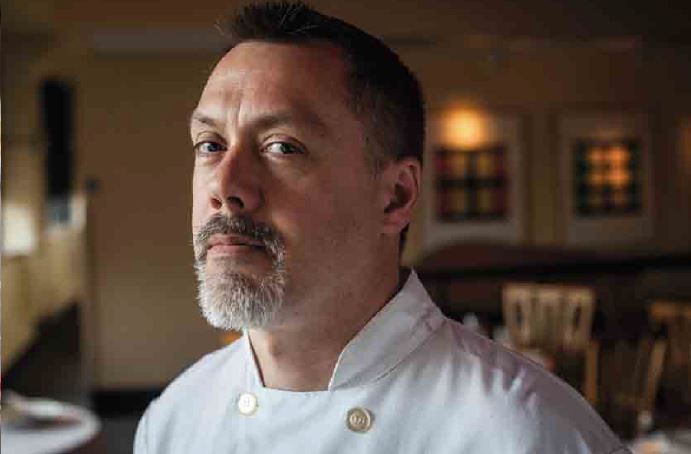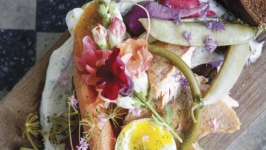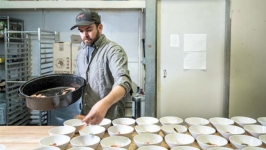The Rattlesnake Club combines local and refined in Detroit
When chef-owner Jimmy Schmidt sold the award-winning Detroit Rattlesnake Club to Stroh’s Company Inc. in 2011, Chef Chris Franz was just hitting his stride. That was a lucky break for foodies around metropolitan Detroit, who had come to love the restaurant’s healthy, locally sourced and seasonally based menu served in a beautiful, modern space near the Detroit Riverwalk.
Franz , now the executive chef at the Rattlesnake Club, had worked with Schmidt over the previous decade and was a part of the restaurant’s original transition to local sourcing, way back before local was hip. He was working away from the restaurant on a stint at local country clubs when he was called back by manager Bob Sereno. “Bob said, ‘Come back, we need you, you can get creative here,’” recalls Franz .
And creativity, for Franz , means being inspired by local and seasonal ingredients. “Probably a good eight or nine years ago when Jimmy was here, he told me to go to Eastern Market,” says Franz . “That’s when we really got started doing local.”
Franz is likely to be spotted shopping at Eastern Market for local produce, meats and cheeses, either among the stalls or at his favorite wholesaler, Del Bene Produce. “I started noticing it getting easier to find local produce a few years ago,” says Franz . “Del Bene will get us anything they can locally. Usually it starts with asparagus. The menu is driven by what is going to be local and seasonal. For our spring menu, we are featuring peas and pea tendrils. This year we are featuring peapods on and grilled ramps.”
Franz is excited about the spring duck. “We brine it in brown sugar and salt, and throw in raisins to get the raisin flavor into the duck breasts,” he explains. “Then we serve it with a curried apple and parsnip gratin accompanied with fresh peas and pea tendrils, and drizzle it with a little bit of a raisin sauce.”
Other local menu items featured this spring include a pasta made with Corridor Sausage Company’s Vietnamese Chicken Sausage over cellophane noodles, Napa cabbage, red chiles and toasted cashews and a rack of Michigan lamb with artichoke, fennel and white bean ragout. The salad menu often features local greens from Werp Farms near Traverse City and Detroit’s Brother Nature Produce. A cheese course features Michigan-made artisanal cheeses, including Montoro—a Michigan-made cheese similar to Manchego—alongside homemade breads and honeyed nuts.
As the season progresses, Franz will start to incorporate more seasonal produce like Michigan tomatoes and sweet corn. In the fall and winter, Michigan root vegetables and squashes will take center stage. He notes that while local is a priority, some items can be harder to find and may come from farther afield. But a closer relationship with Eastern Market Corporation may begin to make it simpler for Franz , and potentially other chefs, to connect with local farm ingredients and strengthen the local food system.
Eastern Market reached out to Franz recently to ask him to test-pilot a new custom growing program. Franz will provide a list of produce needs to the Eastern Market early in the growing season, and the market will work as a sort of matchmaking service, striking deals with local growers to make sure the right products are grown and will be available as needed.
“We just need to understand the chef’s needs,” says Christine Quane, wholesale market coordinator at Eastern Market. “Then we can start working together with different growers and start to map out how the season is going to look and how we are going to run logistics.”
For such a program to work, it requires a great deal of commitment from both the chef and the farmer and constant communication, says Quane. “I need the chef and the growers to be in contact, because that way they’ll be more accountable to each other. And Eastern Market will be there on the sidelines to check in with them both.”
Quane expects to meet a substantial portion of Gautz’s needs with wholesale growers, but intends to also coordinate with smaller, urban growers who may be interested in having the opportunity to be featured on the Rattlesnake Club’s illustrious menu. The smaller growers can then coordinate dropping off their orders with the wholesaler at Eastern Market.
Making those local connections means a lot to Franz , a native of Detroit. He started his restaurant career as many chefs do, as a dishwasher, and then worked alongside some of the top chefs in the region. And after spending a few years away from the Rattlesnake Club, he is glad to be back. “I can be creative with local food here,” he says. “And people enjoy it.”
Learn more at The Rattlesnake Club








